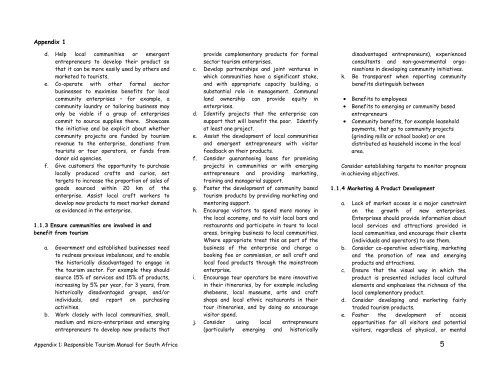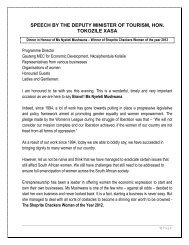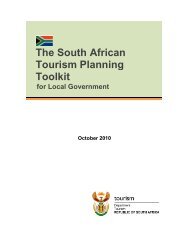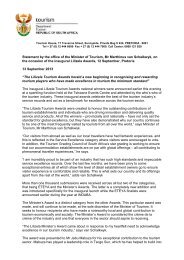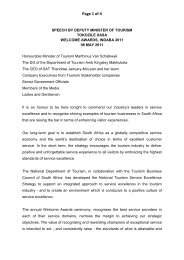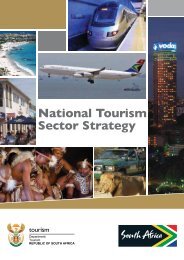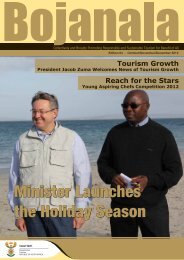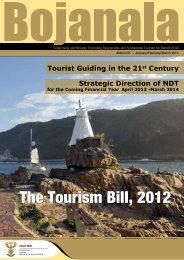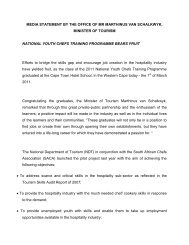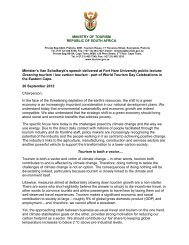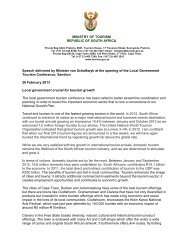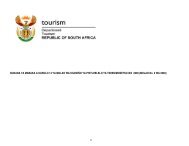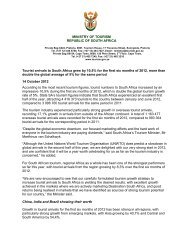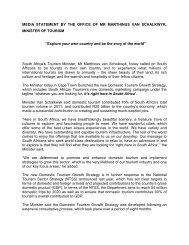Responsible Tourism Manual - Tourism Knowledge Portal
Responsible Tourism Manual - Tourism Knowledge Portal
Responsible Tourism Manual - Tourism Knowledge Portal
Create successful ePaper yourself
Turn your PDF publications into a flip-book with our unique Google optimized e-Paper software.
Appendix 1<br />
d. Help local communities or emergent<br />
entrepreneurs to develop their product so<br />
that it can be more easily used by others and<br />
marketed to tourists.<br />
e. Co-operate with other formal sector<br />
businesses to maximise benefits for local<br />
community enterprises – for example, a<br />
community laundry or tailoring business may<br />
only be viable if a group of enterprises<br />
commit to source supplies there. Showcase<br />
the initiative and be explicit about whether<br />
community projects are funded by tourism<br />
revenue to the enterprise, donations from<br />
tourists or tour operators, or funds from<br />
donor aid agencies.<br />
f. Give customers the opportunity to purchase<br />
locally produced crafts and curios, set<br />
targets to increase the proportion of sales of<br />
goods sourced within 20 km of the<br />
enterprise. Assist local craft workers to<br />
develop new products to meet market demand<br />
as evidenced in the enterprise.<br />
1.1.3 Ensure communities are involved in and<br />
benefit from tourism<br />
a. Government and established businesses need<br />
to redress previous imbalances, and to enable<br />
the historically disadvantaged to engage in<br />
the tourism sector. For example they should<br />
source 15% of services and 15% of products,<br />
increasing by 5% per year, for 3 years, from<br />
historically disadvantaged groups, and/or<br />
individuals, and report on purchasing<br />
activities.<br />
b. Work closely with local communities, small,<br />
medium and micro-enterprises and emerging<br />
entrepreneurs to develop new products that<br />
provide complementary products for formal<br />
sector tourism enterprises.<br />
c. Develop partnerships and joint ventures in<br />
which communities have a significant stake,<br />
and with appropriate capacity building, a<br />
substantial role in management. Communal<br />
land ownership can provide equity in<br />
enterprises.<br />
d. Identify projects that the enterprise can<br />
support that will benefit the poor. Identify<br />
at least one project.<br />
e. Assist the development of local communities<br />
and emergent entrepreneurs with visitor<br />
feedback on their products.<br />
f. Consider guaranteeing loans for promising<br />
projects in communities or with emerging<br />
entrepreneurs and providing marketing,<br />
training and managerial support.<br />
g. Foster the development of community based<br />
tourism products by providing marketing and<br />
mentoring support.<br />
h. Encourage visitors to spend more money in<br />
the local economy, and to visit local bars and<br />
restaurants and participate in tours to local<br />
areas, bringing business to local communities.<br />
Where appropriate treat this as part of the<br />
business of the enterprise and charge a<br />
booking fee or commission, or sell craft and<br />
local food products through the mainstream<br />
enterprise.<br />
i. Encourage tour operators be more innovative<br />
in their itineraries, by for example including<br />
shebeens, local museums, arts and craft<br />
shops and local ethnic restaurants in their<br />
tour itineraries, and by doing so encourage<br />
visitor spend.<br />
j. Consider using local entrepreneurs<br />
(particularly emerging and historically<br />
disadvantaged entrepreneurs), experienced<br />
consultants and non-governmental organisations<br />
in developing community initiatives.<br />
k. Be transparent when reporting community<br />
benefits distinguish between<br />
• Benefits to employees<br />
• Benefits to emerging or community based<br />
entrepreneurs<br />
• Community benefits, for example leasehold<br />
payments, that go to community projects<br />
(grinding mills or school books) or are<br />
distributed as household income in the local<br />
area.<br />
Consider establishing targets to monitor progress<br />
in achieving objectives.<br />
1.1.4 Marketing & Product Development<br />
a. Lack of market access is a major constraint<br />
on the growth of new enterprises.<br />
Enterprises should provide information about<br />
local services and attractions provided in<br />
local communities, and encourage their clients<br />
(individuals and operators) to use them.<br />
b. Consider co-operative advertising, marketing<br />
and the promotion of new and emerging<br />
products and attractions.<br />
c. Ensure that the visual way in which the<br />
product is presented includes local cultural<br />
elements and emphasises the richness of the<br />
local complementary product.<br />
d. Consider developing and marketing fairly<br />
traded tourism products.<br />
e. Foster the development of access<br />
opportunities for all visitors and potential<br />
visitors, regardless of physical, or mental<br />
Appendix 1: <strong>Responsible</strong> <strong>Tourism</strong> <strong>Manual</strong> for South Africa 5


